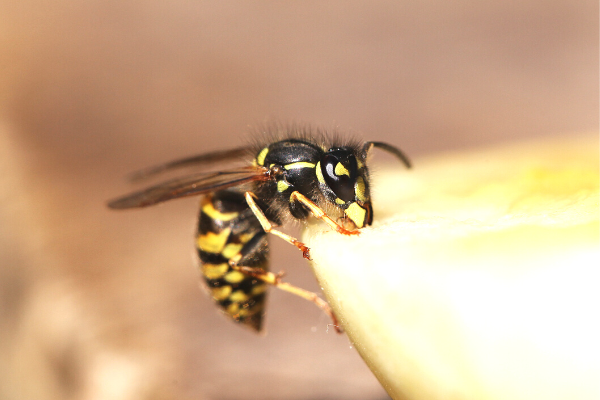
Bees and wasps are essential to our ecosystem, but that doesn’t mean you want them buzzing around your front or backyard while you’re trying to enjoy the summer heat. Hosting a backyard dinner or having your kids’ friends over can quickly turn from fun and playful to frightening with a swarm of stinging insects. Plus, if someone in your family is allergic to bee or wasp stings, it’s extra important to keep bees and wasps at bay to keep them safe. Check out the best natural wasp and bee repellents to keep your home free of stinging insects this summer.
12 Natural Wasp and Bee Repellents
1. Eucalyptus Oil
Eucalyptus oil is one of the most effective essential oils for deterring bees and wasps. They’re not fans of the fragrance and will stay away if they smell it. You can apply eucalyptus oil directly to your skin or dip pieces of cotton balls in it and place it around different areas of your yard to ward them off. You can also try using eucalyptus plants in your garden, but they won’t work as well as the oil itself.
2. Fresh Cucumber
This one may surprise you, but cucumber is actually a great repeller of bees and wasps. They’re not big fans of the acidic cucumber peels. Slice a fresh cucumber and place it on aluminum foil or place the cucumber slices in an aluminum pie dish. You can also plant cucumbers themselves to use in your kitchen for salads and snacks. Cucumbers also deter slugs and other types of bugs by creating a chemical reaction.
3. Peppermint Oil
Peppermint essential oil can repel stinging insects like bees and wasps as they really dislike the smell. There are a few ways you can use peppermint oil to keep them away. Before heading outside, roll oil on your wrists and temples to keep bees and wasps away while you enjoy the sun. You can also add several drops to some cotton balls and place them around your yard to ward them off.
4. Clove Oil
Clove oil is an effective repellent against bees, wasps and other insects. You can spray it on your plants to deter the stinging insects, but make sure to dilute it with water. Add clove oil and water to a plastic spray bottle and give the bottle a shake. It will leave a subtle scent on your plants that deters bees and wasps but also keeps your plants safe. You can also spray it onto your clothing for extra protection.
5. Basil
Basil is great herb you can plant in your garden to repel bees and wasps. It also makes an excellent addition to tomato sauces and other homemade dishes. Although basil may smell delicious to us, bees and wasps are turned off by its fragrance. Basil needs 6-8 hours of full sun each day and grows best in areas with excessive heat.
6. Marigolds
Marigolds are such a pretty addition to any garden and they come with an upside – their fragrance can keep bees and wasps away. Although marigolds can attract a small number of nectar-seeking honeybees, it’s not at all attractive to wasps. Marigolds are ideal for beginner gardeners because they don’t require much effort to maintain. Try using red varieties to ward off bees.
7. Garlic
Garlic is known as a common way to ward off bees, wasps and other insects or pests. You can sprinkle garlic powder near windows or crush up garlic cloves and leave them in your garden. You can also chop up some garlic and let it soak in a glass of water for a few days. Bring it with you when you head outside and place it beside you to keep them from invading your space.
8. Citrus Essential Oil
Any citrus essential oil such as orange, grapefruit or lemon works as a safe deterrent for bees and wasps. These oils produce a potent smell that bees and wasps aren’t fond of and they don’t need to smell much of it to experience discomfort. Even a diluted form of citrus essential oil will keep them away. Citrus is also quite effective against mosquitos and other pests.
9. Cedarwood Oil
The smell of cedarwood oil is woodsy and homey, so if you’d rather that than a sweet-smelling fragrance, it may be the best option for your yard. Cedarwood is often used for many forms of pest mitigation, as the wood’s oil contains natural acids and aromatic hydrocarbons. It releases natural chemicals that have the same effects as an organic pesticide.
10. Thyme
Thyme is another natural wasp and bee repellent that works really well. It’s super low maintenance and is a perennial, meaning it survives through all seasons. The easiest way to grow thyme is in a container on your porch and you can use it in a variety of homemade dishes.
11. Distilled Vinegar
Distilled vinegar is a great alternative to commercial repellents if you want to keep bees and wasps away without using strong chemicals. Pour vinegar into small, open containers and leave them in areas where you don’t want bees and wasps swarming. They really don’t like the strong smell of vinegar and will keep away. You can also clean items like birdhouses with vinegar once they’re empty so you don’t have to worry about finding beehives inside.
12. Citronella Oil
Pure citronella oil is super potent, making it a common ingredient in commercial bug repellent products. It’s often marketed as a mosquito repellent, but works as a wasp and bee repellent as well. Citronella oil evaporates relatively quickly, so it requires more frequent applications, but offers excellent results!
If you’re worried about bees and wasps getting in the way of your fun this summer, try these natural repellents to keep them out of your yard and away from your family.
